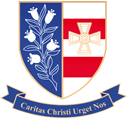We at St. Joseph’s Catholic Academy aim to create an environment where all members of the school community are encouraged to follow Christ’s call to ‘Love Thy Neighbour’. There is no place in our school community for bullying. We believe parents and carers have a vital role in ensuring their child adheres to the school rules and supports the school when dealing with contentious issues.
The following statement was chosen by the pupils of St. Joseph’s Catholic Academy in 2018-19 as their definition of bullying: ‘Bullying may be defined as any deliberately hurtful behaviour, usually repeated over a period of time and intentionally hurts another pupil or group physically or emotionally, where it is difficult for those being bullied to defend themselves, and is often motivated by prejudice.’ If the action is a one off event, it will be classed as a hurtful incident and dealt with according to the behaviour policy.
To keep our school safe we ask students to:
● Be involved in a proactive school council.
● Support the school rules, rights, responsibilities and consequences.
● Take responsibility for your behaviour.
● Respond to school concerns positively and without delay.
We ask pupils to
Tell a responsible adult or a peer mentor if they feel that they or someone else may be being bullied or is bullying someone. This member of staff or peer supporter will inform the Head of House and the anti-bullying lead. Students will be asked to write a statement and an investigation will be carried out to decide if it is bullying or a hurtful incident.
Actions which will be taken
In the first instance the person accused of bullying will be given a formal bullying warning and punishment inline with the behaviour policy. Any further incident or discussion about the current incident would be considered to be further bullying. Support and counselling will be offered and all students involved will have a restorative.
If the Head of House decides it is appropriate or it is a pupil’s second offence the Deputy Head will become involved. Parents will be invited in and given a Formal School Warning. Exclusion for the offence will be decided at the Head of School’s discretion (and all students involved will have a restorative.
These are minimum sanctions. In very serious cases it may be necessary to make a report to the Police or Social Services. Incidents of reported bullying will be followed up by Heads of House, to monitor that the problem has been resolved. Proven incidents of persistent harassment and intimidation may result in a permanent exclusion.
The below are some of the symptoms which you might see in a child who is being bullied:
● They may refuse to attend school.
● They may say they have headaches, stomach aches, anxiety, irritability or stress.
● They may have few or no noticeable friends around.
● They may lose money or property.
● They may have unexplained bruises etc.
● They may be unwilling to talk about school.
If you have concerns then you should:
1. Speak to staff at school about the problem.
2. Talk to your child and empathise with the situation.
3. Allow staff at school some time to respond to the issue.
4. If the issue is not resolved see the Head of School.
5. Support your child and the school by becoming involved in reviewing the policy.
6. If you feel the matter is not resolved then you can follow the complaints procedure.
It is the parents, pupils, school and governors responsibility to try and reconcile bullying incidents that may occur. You can obtain a copy of the school anti-bullying policy from the school website.
If your child is carrying out bullying behaviours then:
● Your child may have money or property that does not belong to them.
● Your child may display aggressive behaviour and belittle others.
These are only guidelines your child may display some or all of these and not be bullying.
If you have concerns that you child is showing bullying behaviour then you should
- Make an appointment to meet the anti-bullying lead or pastoral team.
- Talk with them to discourage their behaviour and discuss how it makes other children feel.
- Give praise when your child displays cooperative behaviour and kindness to others.
- Monitor their use of social media and other forms of communication.
Suggested resources for parents/carers:
https://www.anti-bullyingalliance.org.uk/tools-information/advice-parents
https://youngminds.org.uk/find-help/feelings-and-symptoms/bullying/
https://assets.publishing.service.gov.uk/government/uploads/system/uploads/attachment_data/file/444865/Advice_for_parents_on_cyberbullying.pdf
https://www.thinkuknow.co.uk/parents
https://www.ceop.police.uk/Safety-Centre/How-can-CEOP-help-me-YP/How-can-CEOP-help-me-parent/
Your anti-bullying lead is Mrs Fryett. If you have any concerns, please do contact her.

